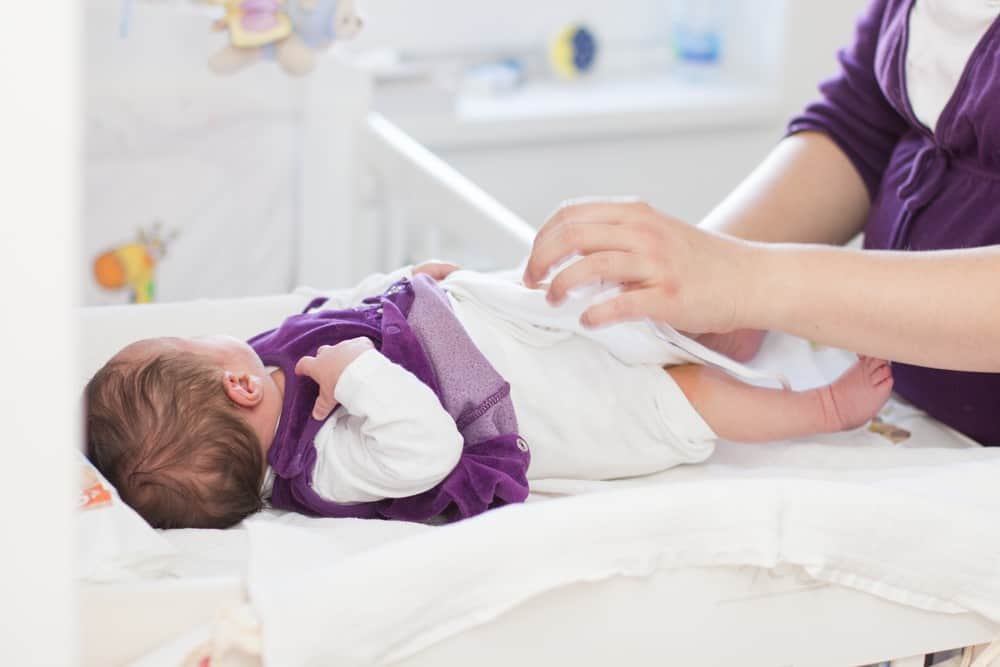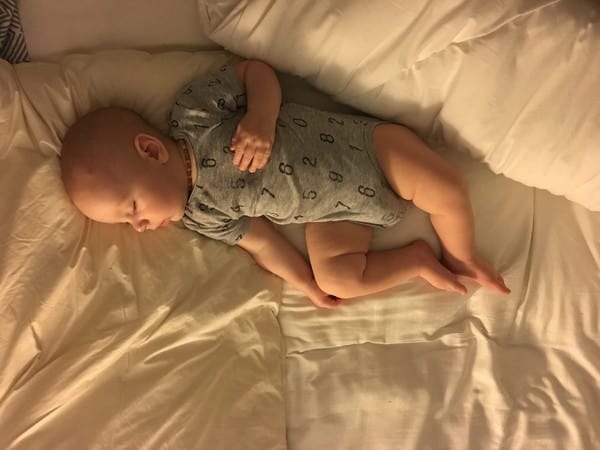Getting a baby to sleep is often the most challenging task of parenthood. Once a baby is asleep, most parents make sure to not let anything come in the way of their baby’s snooze time as it is also the time when parents get to relax.
Parents are generally reluctant to wake their babies without any reason and the precious night-sleep hours are too tempting to waste for the sleep-deprived parents.
It is natural for first-time parents to be anxious and have a lot of doubts and questions. One such question which tops the list is how often to change a newborn’s diaper at night? Don’t worry, we have got your baby’s bottom covered.
By the end of this post, you will learn the tricks and tips to offer your baby and yourself the luxuries of a good night’s sleep.
How Long Can a Baby Wear a Diaper at Night? It is not always necessary to change your baby’s diaper, unless it is extremely wet (leaky pajamas) or if your baby has pooped. A diaper rash is equally haunting for babies as well as their parents, but if you aren’t experiencing any such issues, then it is okay to let your baby sleep through the night or for longer durations rather than waking them up.
You can also check our List of OverNight Diapers.
So, you shouldn’t fret about the wet diaper in the middle of the night. It is really OK to wait and give yourself that well needed time to relax and you shouldn’t feel guilty about it. Baby and diaper is one comprehensive subject, so let’s jump into the art of when, why and how to change diapers at night.
How Often Should I Change my Baby’s Diaper?
Diaper changing frequency decreases as the baby grows. Newborns come first in the list of wet and dirty diaper group. As a rule of thumb, newborns require 10-12 diaper changes per day, while the older babies and toddlers would require 6-9 changes per day.
{Tip: It is wise to keep a record of your baby’s diaper change and other schedules with a tracker app, it not only helps you to mark deviations but the details also come handy while discussing your child’s issues with the pediatrician.}
How Often to Change a Newborn’s Diaper at Night?
Babies urinate nearly 20 times a day, especially during the initial months of their lives. It wouldn’t just be expensive but exhausting as well if you try to change your baby’s diaper every time they pee.
While, you may want to change him or her every 2 to 3 hours, but it is unnecessary to wake your baby up to change a wet diaper. Newborns often wake up at night for feeds and this is the best time for you to freshen them up.
{Tip: Change the diaper before feeding them, as babies mostly fall back to sleep during or after their milky treat.}
However, there are many occasions where you will find that it is impossible to avoid changing your baby’s diaper at night while they are still asleep.
Luckily, it is sometimes possible to change your baby’s diaper without waking them up. It may sound tricky but is doable.
Here are a few tips to meet success in such occasions and become a pro as you practice them.
- Make sure not to switch on the lights. Keep the lights as dim as possible and make minimum noise (the more the stimulus, the more difficult it will be to put your baby back to sleep).
- Make sure your baby is in a deep state of sleep (slow breathing and heavy limbs are signs of deep sleep).
- Don’t change your baby’s position for changing the diaper, perform the movements slowly and with a lot of patience.
- If you wish to use a wipe, then it is advisable to warm the wipes before using (a cold wipe can stimulate a baby to wake up).
- Don’t try to move your baby after changing the diaper (if she stayed asleep through the process).
Regardless of how carefully you manage this, on many occasions, you will have to compromise with your sleep, but a few handy steps allow you to put your baby back to sleep as soon as the nappy change is over.
If the baby gets awake during or even before the diaper change process, then you must avoid making any eye contact with the baby as it stimulates them.
Keep the light setting dim, light has the same effect on your baby as it has on your droopy eyes. Avoid making any loud noises. Talking to your baby or making unnecessary noise will wake her up completely and make it difficult for her to fall asleep again.
Should You Wake a Baby to Change a Poopy Diaper?
It is recommended to change a poopy diaper as quickly as possible because bacteria in the stools can not only irritate your baby’s skin to cause a diaper rash, but it can also cause bladder infections.
According to the American Academy of Pediatrics (AAP), a dirty diaper must be changed as soon as possible. Leaving babies in prolonged contact with their feces makes them susceptible to yeast and other bacterial infections.
Also, make sure you wipe your baby clean after every poopy session, even in those easy to miss areas such as around the genitals for girls and below the scrotum for boys and under their skin folds.
You can leave them open for a few minutes to make sure the area is completely dry before putting in another diaper.
Do You Need to Change a Wet Diaper Straightaway?
As I said, the frequency of diaper change decreases with age. However, for newborns, it is recommended to change the diapers at least 3 times at night.
Urine itself is not a problem when it comes to wet diapers, but it is the alkaline pH which irritates the babies’ soft skin if left exposed for longer.
Over a period, it also alters the neutral pH of babies’ skin and creates a perfect breeding ground for bacteria and yeasts. Prolonged exposure to moisture gradually breaks the skin barrier and leads to painful diaper rashes.
{Tip: Breastfed babies have fewer gastric issues and they tend to have a low frequency of urination as compared to formula-fed babies. Breast milk is easy to digest and so, babies who consume only breast milk are less likely to experience episodes of diarrhea as well as other digestive issues and hence they have lesser chances of having a diaper rash than formula-fed babies.}
How to Avoid or Minimize Diaper Changes at Night
Changing a diaper is a fun activity for parents and babies during the day, but at night this brings in a lot of doubts and confusion among new parents.
How to make your baby sleep for longer durations at night is one of the most pertinent questions that lingers on every new parent’s mind. Here are a few tips which will help you to avoid or limit the number of diaper changes at night.
Change your baby’s diaper just before bedtime. You can use the highly absorbent night-time diapers; these expensive diapers are very effective at moisture absorption.
You can switch to other economical options during daytime but using these specially designed night diapers will definitely pay off through those comfortable periods of sleep.
Use diaper rash cream to protect your baby from rashes. These creams contain zinc oxide which acts as a protective barrier between moisture and your baby’s delicate skin, not just that, the antimicrobial properties of zinc oxide help to avoid infections.
Often, parents apply too little cream and babies end up getting a rash, you must be too generous while applying the cream, otherwise, it will fail to create a protective barrier against feces and urine. Alternatively, you can also use petroleum jelly, but it is not as effective as a diaper rash cream.
Make sure the diaper fits well to avoid any leaks. {Tip: If you are not using special newborn diapers then make sure you fold the diaper top to guard the umbilical area against diaper friction.}
Dress your baby to provide easier access in case you have to change a diaper at night. {Tip: Use open bottoms pajamas or zip-up footie pants at night.}
Cloth diapers are many people’s choice for overnight. A cloth diaper is made up of superabsorbent material all the way around and thus, is very efficient in catching any leaks.
These diapers are made from natural fabrics and are very gentle on babies’ soft skin. Cloth diapers aren’t expensive as they can be washed and reused.
Conclusion
Following these tips and guidelines will limit the diaper changes at night and will do wonders for you and your baby. Eventually, the baby will urinate less at sleep and will also stop pooping at night, then, you can stop changing diapers at night.
However, every baby is different and no better than their parents know what works best for their little ones.
So, the first-time parents might find it difficult today, but trust me, you will be better at it in a couple of weeks and in due course, your baby will stop needing night time diaper changes and will learn to sleep through the night in a single diaper.

